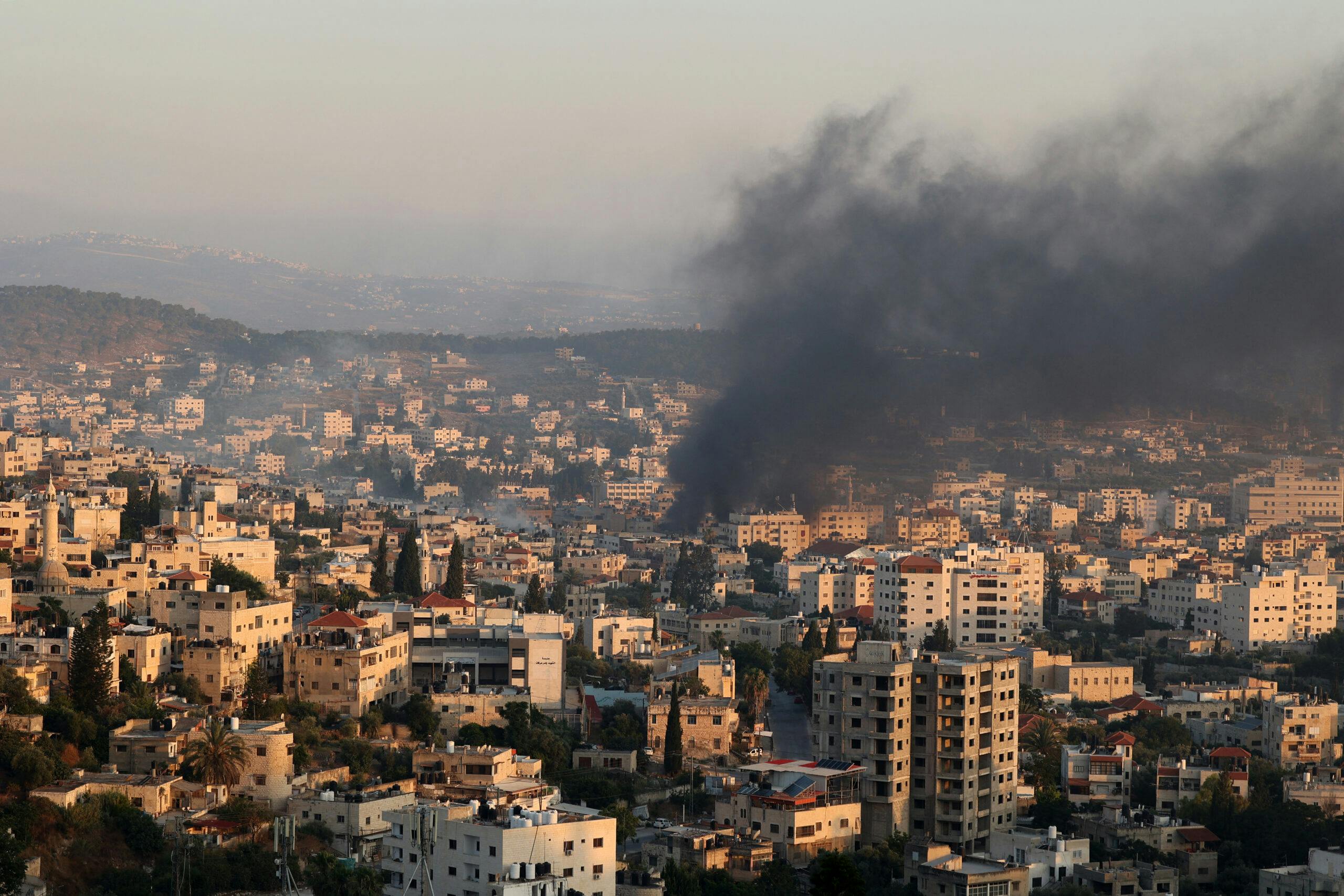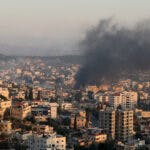
Excessive Force: A Legal Analysis of Israel’s Operation in Jenin Refugee Camp
13 July 2023On 3 and 4 July, Israeli forces conducted a large-scale operation in Jenin refugee camp, reportedly killing 12 Palestinians (four of them children) and injuring 143 others – “the highest number of Palestinian fatalities in a single operation in the West Bank” since 2005, according to OCHA.
The operation also inflicted extensive damage on public infrastructure and private homes, and resulted in the displacement of an estimated 3,500 residents.
The legal analysis seeks to clarify the legal framework applicable to the operation in Jenin, focusing particularly on the use of force.
Contextual background
On 3 and 4 July 2023, the Israeli army carried out a large-scale operation, which it named “Operation Home and Garden”, in Jenin refugee camp in the northern occupied West Bank. In the following, a short overview of relevant facts about the operation, based on information publicly available at the time of writing, is presented.
According to data from the United Nations (UN) Office for the Coordination of Humanitarian Affairs (OCHA) in the occupied Palestinian territory (oPt), at least 12 Palestinians were killed – four of them children – and a further 143 wounded during the operation, marking “the highest number of Palestinian fatalities in a single operation in the West Bank” since the commencement of systematic recording by OCHA in 2005. This comes against the backdrop of recent reports by OCHA that 151 Palestinians have been killed and thousands more injured by Israeli forces in the West Bank since the start of the year, with 2023 on course to become the deadliest year since 2005.
The operation involved air and ground forces, and has been deemed the “most intense” in the West Bank since the Second Intifada in the early 2000s, when a major Israeli military incursion left at least 52 Palestinians and 23 Israeli soldiers dead, and reduced parts of Jenin refugee camp to rubble. Over the last 1.5 years, Jenin has again been the site of frequent military raids, including in January and June this year, in response to what the Israeli authorities allege to be an increased threat of terrorism.
The Jenin refugee camp is a densely populated urban space. According to the UN Relief and Works Agency for Palestine Refugees in the Near East (UNRWA), the camp’s size is 0.42 square kilometres, and in 2022 23,628 residents of the camp were registered as Palestine refugees with the organization. The residents were either displaced, or are descendants of those who were displaced, in 1948.
“Operation Home and Garden” commenced in the early hours of 3 July and lasted around 48 hours. Initially, the Israeli military carried out airstrikes, then bulldozed roads leading to and in the camp – allegedly to uncover explosives hidden underneath – and deployed an estimated 1,000 ground forces to the camp. During the course of the operation, the Israeli military entered and damaged or destroyed private homes, reportedly drilling holes in the walls of houses to move from one to the next. Electricity, water, and sewage networks suffered extensive damage, leaving a significant number of residents without water and electricity. The internet was also reportedly cut off, according to residents. Because some roads in and around the camp were bulldozed, ambulances were reported to have encountered difficulties reaching the wounded and injured inside. For two days, access to the camp was restricted mainly to one entrance, with Israeli forces imposing access and movement restrictions and carrying out inspections of incoming vehicles, including ambulances. There were also reports about sound grenades and tear gas canisters fired in close proximity to and landing on the premises of hospitals, and a video emerged depicting the Israeli military targeting the equipment of journalists documenting the operation. Finally, estimates regarding the number of Palestinians who were displaced due to the fighting and destruction range from 3,500 to 4,000. OCHA has reported that as of 11 July, at least 40 families remain displaced, while others have returned to “their uninhabitable homes” for lack of other options.
Eight Israelis were injured in a car-ramming and stabbing attack in Tel Aviv on 4 July – allegedly in retaliation for the operation. One Israeli soldier was killed apparently by friendly fire during the Israeli military’s withdrawal from Jenin, and in the early hours of Wednesday 5 July, Palestinian groups fired five rockets from the Gaza Strip. The Israeli military responded with airstrikes on Gaza.
Several States and the European Union (EU) expressed concern over the situation in Jenin and called for compliance with applicable rules of international law. UN Secretary-General Antonio Guterres condemned the operation, while three UN Special Rapporteurs referred to “egregious violations of international law and standards on the use of force” that “may constitute a war crime”. “The military assault on Jenin was painful. What happened is a violation of international law”, Sven Kühn von Burgsdorff, the EU Representative to Palestine, was quoted saying on a visit to Jenin on 8 July. “We are concerned about the deployment of weaponry and weapons systems which question the proportionality of the military during the operation”.
Official positions of the Israeli military and government
The Israeli military described the operation as a “counterterrorism strike”, alleging that Jenin had become a “safe haven for terrorists”, and that significant parts of the population are affiliated with Hamas and Palestinian Islamic Jihad (PIJ). “There’s a mindset that we want to break, which was basically having the camp as a safe haven for terrorists”, a spokesperson emphasized. The military further claimed that since the start of the year, “over 50 shooting attacks have been carried out by terrorists” hailing from Jenin, and that “19 terrorists fled to the Jenin Camp after carrying out attacks since September 2022”. Days before the operation, the Israeli military also reported the launching of a rocket from the Jenin area towards Israeli territory.
While the operation was ongoing, the military announced that they would “continue operating until the terrorists of Jenin are no longer a threat to the stability of the area”, and that they were “removing the source of terrorism before it results in further attacks”. Speaking at the US Embassy in Jerusalem about the raid, Israeli Prime Minister Benjamin Netanyahu commended Israeli soldiers, denounced terrorist activity, and affirmed that “anyone who kills, murders Israelis, anyone who pushes to murder us, belongs either in prison or in the grave” – reiterating a remark which he also made during a cabinet meeting a day prior to the start of the operation.
The Israeli military viewed the operation as successful, claiming, inter alia, that the authorities confiscated more than 1,000 weapons; questioned more than 300 suspects, 30 of whom were arrested; and dismantled “hideouts”, “operational situation rooms used for terrorist activity”, and “explosives manufacturing facilities”. A spokesperson for the Israeli military stated after the conclusion of the operation that “the camp has lost capability”, while Israeli Defence Minister Yoav Gallant claimed that due to activities of the Israeli Security Forces (ISF) Jenin is no longer “a ‘production site’ for terrorism”.
At the highest political echelon, Netanyahu maintained that Jenin was not a one-off event. A spokesperson for the military echoed the Prime Minister’s remarks, stating that the “fight against terrorism has not ended”.
The analysis that follows is applicable to similar operations that the Israeli military may conduct in the future.
1. What is the applicable legal framework regulating the use of force by Israel in its most recent operation in Jenin (dubbed “Operation Home and Garden”)?
2. To what extent does Israel’s conduct during this operation comply with the applicable rules on the use of force?
3. Israeli officials have stated that they were operating to “neutralize the threat of terrorism from the area of Jenin”, purportedly acting in self-defence. How do these stated objectives conform with international law?
4. Is the intentional killing of alleged “terrorists” in Jenin lawful?
5. Did Israel discharge its obligations with regards to medical care for persons injured during the course of the operation?
6. What are Israel’s responsibilities with respect to homes and infrastructure damaged or destroyed in the course of its operation?
7. Who is responsible for the provision of humanitarian aid in the aftermath of the operation?
8. What are Israel’s obligations towards people who were displaced as a result of the operation?
9. Which measures are required to ensure accountability for any violations of international law committed during the operation?
For further resources on the use of force:
- Legal brief on the use of force in law enforcement operations in the occupied Palestinian territory, which elaborates on the applicable rules in greater detail;
- Q&A on the use of force in law enforcement in the occupied Palestinian territory, which focuses specifically on demonstrations;
- Diakonia Easy Guide to IHL (available in English and Arabic).
For further resources on accountability see our Q&A on the forthcoming ICJ advisory opinion and our Q&A on the ICC investigation into the Situation in Palestine.
photo: Smoke billows from houses inside a refugee camp in the occupied West Bank city of Jenin on July 3, 2023, after an Israeli strike. © AFP / Jaafar Ashtiyeh.
